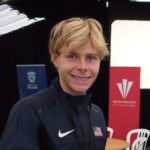
Tayte Pollmann’s articles are supported by American Trail Running Association corporate member Nike Trail Running. You can follow Tayte’s adventures on Facebook, Twitter and Instagram. Photos by Andrew Simmons.
This past Thursday July 11, 2019, I had the opportunity to give a talk on collegiate and post-collegiate running opportunities at the Peak Performance Running (PPR) Summer Altitude Camp for high schoolers, held in Keystone, CO. After having helped coach adults at the Active at Altitude Trail Running Camp this past May, I was curious to see what an altitude running camp could offer to high school runners.
After spending half a day at the camp, I learned there are many reasons for young runners to attend the PPR Summer Altitude Camp. The camp prepares runners for future cross country and trail racing, and helps them discover keys to long-term enjoyment and success in running. Listed below are my top reasons young runners should attend a summer running camp such as the PPR Summer Altitude Camp. Both middle school and high school options are available for PPR camps.

Practice Team-Building Skills
Learning how to run with a team will help you become a better runner. Young runners typically train on track and cross country teams in middle school and high school, or on club teams. Graduating high school seniors may look for opportunities to run on collegiate teams in the NCAA, NAIA or Junior College levels. Training with a team will help elevate both your own running as well as that of your teammates.
The PPR camp offers many opportunities to practice team-building skills. Campers come from across the country and represent a wide range of running abilities from beginners to nationally -ranked high school track and cross country runners. Upon arrival at the camp, runners are divided into groups and earn points for their teams throughout the week in activities such as a ski hill climb, plank -competition, tug-of-war, group sit-up challenge and dance-off.
Head coach of Peak Performance Running, Andrew Simmons, stresses the importance of building a cohesive group mentality that helps all campers improve and have a positive experience, regardless of running ability.
According to Simmons, “One of the biggest pieces of our team and team camp is not only in diversity of abilities, but the respect we give to the first and last finishers. I personally believe that training with a group is what not only brings people together but what keeps them moving forward. I looked at our team on that final ascent of the ski hill and it told me everything I needed to know. It didn’t matter what school you went to, it’s about putting yourself out there, being vulnerable and living our mission as a company to become the best version of ourselves, which often means getting uncomfortable!”

Receive Advice From Expert Coaches
Receiving coaching advice from experienced professionals early-on in your running career is important for your growth as a runner. Coaches can help you improve form, avoid bad-habits and train smarter long-term. The Peak Performance Running coaches Andrew Simmons and Katie Whidden have extensive coaching credentials, including a USA Track and Field Level 2 certification specializing in Endurance, Lydiard Certification, CSCS in strength and conditioning, as well as certifications from USA Triathlon and USA Cycling.
The camp featured a talk from a certified nutritionist to help runners recognize the link between nutrition and running performance. Additionally, there was a talk on collegiate and post-collegiate running which included Tabor Scholl, University of Colorado cross country and track runner, Nathan Davis, former US Junior Mountain Running Team Member and Colorado School of Mines cross country and track runner and myself. The talk followed an interview format that prompted discussion on topics such as how to choose the right collegiate running program, avoiding injury, communicating with coaches, pursuing scholarships, and running after college.

Run on a Variety of Trails
There are a wide variety of trails you can encounter in cross country and trail races, including flat, steep, straight, winding, switchbacking, rocky, rooty, or muddy. It can often take time to adjust to new types of terrain, so it’s beneficial to introduce yourself to a diversity of terrain from an early age.
The PPR camp offers many types of trails including single-track switchbacks, mountain biking trails, dirt roads and even a ski hill. Runners leave camp better prepared for the many types of terrain they will encounter in their future trail and cross country races.

Run at High Altitude
Running at high elevation challenges you to train harder by running in an environment where there is less oxygen in the air. At high elevations runners develop more red blood cells, which enables them to perform better at endurance events. After training for weeks or months at higher elevations, running at lower elevations often feels easier. The PPR camp gives campers the opportunity to train in Keystone, CO, elevation 9,173 feet, which better prepares runners for their training and racing following the camp.
Several athletes who attended this camp will be competing at the National High School Trail Championships to be held Saturday July 27, 2019, in Salida, CO. Stay tuned for our post-event write up.
Are you interested in working with a running coach? We have national directory of over 120 coaches who specialize in working with trail runners of all ages and ability levels.


